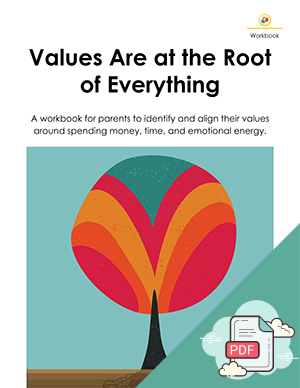What are family values? Do they differ from other values? Are they important? Do you need them? Can they change? Most parents trying to raise thoughtful and responsible kids find themselves asking these kinds of questions more often than you might think.
Most of us believe we are clear on our values and generally live our lives accordingly. But then we get married and perhaps have children.
Suddenly, we’re tested in all kinds of ways. We have to start making some small and some very large decisions that affect our partners and our kids. It’s then that we realize our priorities might have to change.
For some, that adjustment comes easily. For others, it can be more difficult than expected.
Personal Values Help You Make Decisions
Personal values are the characteristics or habits that motivate you to make a particular decision or act one way or another. Whether we consciously think about it or not, we all have our own values that guide the decisions we make and how we live day-to-day.
Your values provide the foundation for nearly all decisions we make as individuals and as parents. They determine your priorities and often are the measure by which we decide if we are living our best life.
That’s why it matters that we become familiar with our true values and figure out if those are family values we want to pass on to our children.
What Are Family Values?
Family values are the values you and your partner use to guide your family and make decisions regarding family matters. These are most likely a combination of your and your partner’s personal values.
They can (and should) change over time as your children mature and you both gain wisdom and insight as parents. What mattered when your children were toddlers changes when they become teens. Your role as a parent changes as well.
Everyday Family Decisions Reflect Your Values
Even if you haven’t had a discussion with your partner or as a family about the values you believe are important, you’ve been basing the family decisions on your family values.
These can include decisions about:
- what activities you do together;
- where you live;
- how you spend/save/donate family money;
- the traditions you create and maintain
- how you handle conflict; and
- much more.
Research from the American Psychological Association shows that families with clearly defined values tend to have stronger communication and better problem-solving skills.
Common Examples of Family Values
Some examples of both personal and family values include:
- Love and respect for others
- Honesty and open communication
- Patience or tolerance
- Forgiveness
- The importance of hard work
- Flexibility
- Wanting to learn
- Spirituality
- Importance of education
- Personal accountability
Personal and Family Values Aren’t Always the Same
Your family values will most likely overlap with your personal ones, but they can include different ones as well. Personal values at work may not be appropriate to the family setting. It’s common to have different values depending on your role in a given environment.
Workplace vs. Family Values
Consider these common shifts:
- At work: Valuing employees or colleagues who do a given task the same way every time, without question
- At home: Valuing your child’s curiosity and allowing time for exploration, even with mundane tasks
Perhaps in your professional environment, there isn’t time or room for exploration in a given task, and you need things done in a certain way. You must manage the schedule and budget a certain way.
At home, however, your role as a parent is to develop your child’s mind and sense of wonder about the world and their capabilities. Safely allowing for trial and error on your child’s part is something someone with a family leader mindset (rather than a manager) does well.
- At work: Valuing eating lunch by yourself and using your phone to tune out the rest of the world one way or another (podcasts, social media, etc.)
- At home: Prioritizing screen-free family meals
We all need a break sometimes. Having time to yourself to reset and recharge is a healthy thing. At work, scrolling on your phone while you eat every now and again is fine. At home, however, if you’re scrolling on your phone while at the dinner table with your kids, you’re telling them what’s on your phone is more important than they are.
It seems harmless when they’re little, but it models a behavior for them you’ll likely be unhappy with when they have access to their own phones as they grow up.
Understanding our personal values raises our level of self-awareness and helps us to be more thoughtful and intentional with our children and partners. Ultimately, that makes for happier, more cooperative, and higher functioning families.
How Family Influences Your Values
Values will be different for everyone. Your personal and family values are based on things that you’ve been exposed to and that influence you. You can get your values from your parents, your beliefs, the media, or the experiences you’ve had, to name a few.
Your family can be one of the most influential things when it comes to developing your own values, which is one of the reasons it’s so important to be intentional with your family values.
Even without meaning to, you are passing on your values to your children in an unconscious way through everyday interactions, simple conversations, and how you use your resources like time, money, and attention.
This can create a problem if your children often spend time with extended family and their values don’t align with your own.
Why Family Values Are Important
Your family values represent what your family judges to be important in life. If your family believes something is important, you’ll spend time and money to acquire it. If not, your family won’t care as much about having it.
Your finances, time, and emotional stamina can be invested in any number of ways. The key to living an intentional and fulfilled life is to align those investments with your family values.
Aligning Values with Your Partner
One of the keys to a prosperous and harmonious family life is aligning those values with those of your partner.
If you aren’t sure what your values are or whether or not they’re aligned with your partner’s, take a look at your actions. Your actions reflect what you value.
Ask Yourself:
- Are your actions consistent with what you believe your values are?
- If not, how can you change your actions to show what you do value?
- What do your spending habits say about your priorities?
- How does your time allocation reflect your stated values?
Workbook
Values Are At the Root of Everything
A workbook for parents to identify and align their family values around money, time, and emotional resources.
- Designed for parents to do together
- 16 page PDF workbook
- Includes four major exercises to do together
Actions Speak Louder Than Words
If you know that your actions, the results of your decisions, are rooted in your values, then it only follows that what you experience in life is directly related to those values.
Just because you say you value something doesn’t mean your actions support it. With new awareness, however, you have the power to make changes in the right direction.
It is paramount that you talk as a family team about your values, why you make the decisions you do, what’s most important to you, and whether your values are really in sync with your behaviors. Remember, values are the root of everything.
What To Do Next
1. Read more in the blog:
The Family Wisdom Blog shares valuable ideas across diverse topics.
2. Explore the Printables Library:
Our printables library is filled with must-have activity ideas, checklists, guides, and workbooks.
3. Subscribe to Our Newsletter:
Sign up for our newsletter for parenting tips to help you create the family team you've always wanted.
Rick Stephens
Rick Stephens is a co-founder of Raising Families. With 33 years of experience as a top-level executive at The Boeing Company and having raised four children of his own, he is able to support parents and grandparents by incorporating his knowledge of business, leadership, and complex systems into the family setting.
In his free time Rick enjoys road biking, scuba diving, visiting his grandkids, and generally trying to figure out which time zone he’s in this week. Read full bio >>






